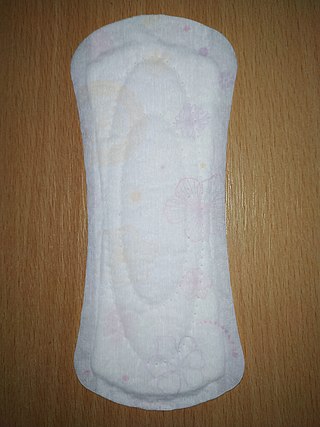
A tampon is a menstrual product designed to absorb blood and vaginal secretions by insertion into the vagina during menstruation. Unlike a pad, it is placed internally, inside of the vaginal canal. Once inserted correctly, a tampon is held in place by the vagina and expands as it soaks up menstrual blood. However, in addition to menstrual blood, the tampon also absorbs the vagina's natural lubrication and bacteria, which can change the normal pH, increasing the risk of infections from the bacterium Staphylococcus aureus, which can lead to toxic shock syndrome (TSS). TSS is a rare but life-threatening infection that requires immediate medical attention.

Toxic shock syndrome (TSS) is a condition caused by bacterial toxins. Symptoms may include fever, rash, skin peeling, and low blood pressure. There may also be symptoms related to the specific underlying infection such as mastitis, osteomyelitis, necrotising fasciitis, or pneumonia.

A menstrual cup is a menstrual hygiene device which is inserted into the vagina during menstruation. Its purpose is to collect menstrual fluid. Menstrual cups are made of elastomers. A properly fitting menstrual cup seals against the vaginal walls, so tilting and inverting the body will not cause it to leak. It is impermeable and collects menstrual fluid, unlike tampons and menstrual pads, which absorb it.

Communication studies is an academic discipline that deals with processes of human communication and behavior, patterns of communication in interpersonal relationships, social interactions and communication in different cultures. Communication is commonly defined as giving, receiving or exchanging ideas, information, signals or messages through appropriate media, enabling individuals or groups to persuade, to seek information, to give information or to express emotions effectively. Communication studies is a social science that uses various methods of empirical investigation and critical analysis to develop a body of knowledge that encompasses a range of topics, from face-to-face conversation at a level of individual agency and interaction to social and cultural communication systems at a macro level.

Louise Elisabeth Glück was an American poet and essayist. She won the 2020 Nobel Prize in Literature, whose judges praised "her unmistakable poetic voice that with austere beauty makes individual existence universal". Her other awards include the Pulitzer Prize, National Humanities Medal, National Book Award, National Book Critics Circle Award, and Bollingen Prize. From 2003 to 2004, she was Poet Laureate of the United States.

Kotex is an American brand of menstrual hygiene products, which includes the Kotex maxi, thin and ultra-thin pads, the Security tampons, and the Lightdays pantiliners. Most recently, the company has added U by Kotex to its menstrual hygiene product line. Kotex is owned and managed by Kimberly-Clark, a consumer products corporation active in more than 80 countries.

Feminine hygiene products are personal care products used during menstruation, vaginal discharge, and other bodily functions related to the vulva and vagina. Products that are used during menstruation may also be called menstrual hygiene products, including menstrual pads, tampons, pantyliners, menstrual cups, menstrual sponges and period panties. Feminine hygiene products also include products meant to cleanse the vulva or vagina, such as douches, feminine wipes, and soap.

Playtex is an American brand name for undergarments, baby products, gloves, feminine hygiene products, and sunscreen. The brand began in 1947 when International Latex Corporation (ILC) created a division named Playtex to produce and sell latex products. Playtex was the first to advertise undergarments on national television in 1955, written by Howard Shavelson at Ogilvy and Mather, and the first to show a woman wearing only a bra from the waist up in a commercial in 1977. They developed space suits for the Apollo program.
Rely was a brand of superabsorbent tampons made by Procter & Gamble starting in 1975. The brand's advertising slogan was "It even absorbs the worry!", and claimed it could hold up longer than the leading tampon, because it was made differently. "Remember, They named it Rely" was the last line of most commercials.

There are many cultural aspects surrounding how societies view menstruation. Different cultures view menstruation in different ways. The basis of many conduct norms and communication about menstruation in western industrial societies is the belief that menstruation should remain hidden. By contrast, in some indigenous hunter-gatherer societies, menstrual observances are viewed in a positive light, without any connotation of uncleanness. In most of India, menarche is celebrated as a right of passage.

Nonviolent resistance, or nonviolent action, sometimes called civil resistance, is the practice of achieving goals such as social change through symbolic protests, civil disobedience, economic or political noncooperation, satyagraha, constructive program, or other methods, while refraining from violence and the threat of violence. This type of action highlights the desires of an individual or group that feels that something needs to change to improve the current condition of the resisting person or group.
Feminism in China refers to the collection of historical movements and ideologies in time aimed at redefining the role and status of women in China. Feminism in China began in the 20th century in tandem with the Chinese Revolution. Feminism in modern China is closely linked with socialism and class issues. Some commentators believe that this close association is damaging to Chinese feminism and argue that the interests of the Chinese Communist Party (CCP) are placed before those of women. Under the Xi Jinping administration, feminist groups have been subject to increased scrutiny by the country's system of mass surveillance.
Louise Audino Tilly was an American historian known for utilizing an interdisciplinary approach to her scholarly work, fusing sociology with historical research. Biographer Carl Strikwerda, states:
This is a list of books about Wikipedia or for which Wikipedia is a major subject.
The concept of toxic masculinity is used in academic and media discussions to refer to those aspects of hegemonic masculinity that are socially destructive, such as misogyny, homophobia, and violent domination. These traits are considered "toxic" due in part to their promotion of violence, including sexual assault and domestic violence. Socialization of boys sometimes also normalizes violence, such as in the saying "boys will be boys" about bullying and aggression.

Tampon tax is a popular term used to call attention to tampons, and other feminine hygiene products, being subject to value-added tax (VAT) or sales tax, unlike the tax exemption status granted to other products considered basic necessities. Proponents of tax exemption argue that tampons, sanitary napkins, menstrual cups and comparable products constitute basic, unavoidable necessities for women, and any additional taxes constitute a pink tax.
Linda Louise Layne is an American anthropologist. She is a visiting fellow at the University of Cambridge in the Reproductive Sociology Research Group (ReproSoc). Her first book was on tribal and national identities in the Hashemite Kingdom of Jordan.
Sharra Louise Vostral is a Professor of History and Science and Technology at the College of Liberal Arts at Purdue University. She has written two books about menstruation and history: Under Wraps: A History of Menstrual Hygiene Technology and Toxic Shock: A Social History.
Natracare is a British feminine hygiene brand that produces organic and plastic-free menstrual products, including tampons, sanitary pads and panty liners.











